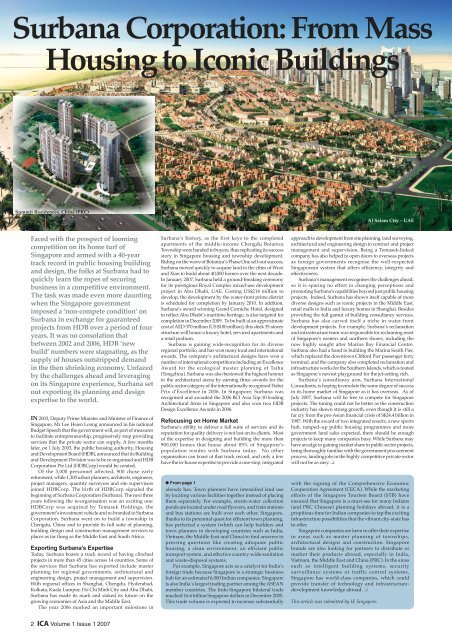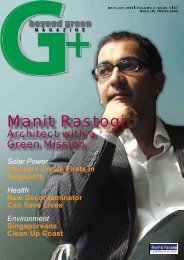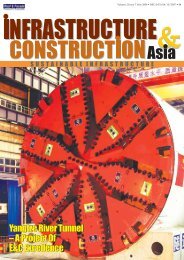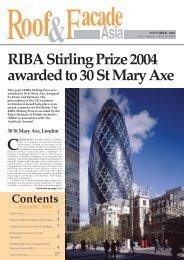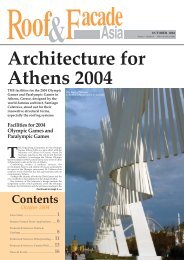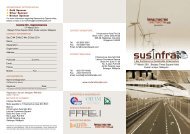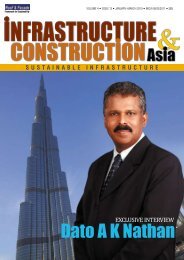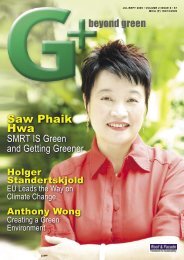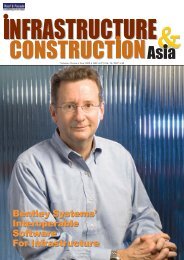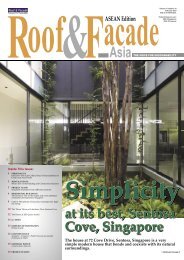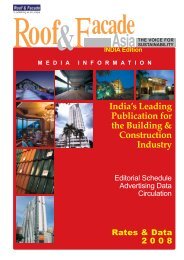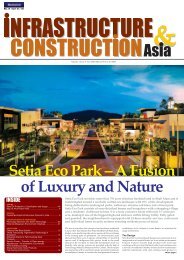ICA_Feb 07.pdf - Roof & Facade
ICA_Feb 07.pdf - Roof & Facade
ICA_Feb 07.pdf - Roof & Facade
You also want an ePaper? Increase the reach of your titles
YUMPU automatically turns print PDFs into web optimized ePapers that Google loves.
Surbana Corporation: From Mass<br />
Housing to Iconic Buildings<br />
Summit Residences, China (PRC)<br />
Al Salam City – UAE<br />
Faced with the prospect of looming<br />
competition on its home turf of<br />
Singapore and armed with a 40-year<br />
track record in public housing building<br />
and design, the folks at Surbana had to<br />
quickly learn the ropes of securing<br />
business in a competitive environment.<br />
The task was made even more daunting<br />
when the Singapore government<br />
imposed a ‘non-compete condition’ on<br />
Surbana in exchange for guaranteed<br />
projects from HDB over a period of four<br />
years. It was no consolation that<br />
between 2002 and 2006, HDB ‘new<br />
build’ numbers were stagnating, as the<br />
supply of houses outstripped demand<br />
in the then shrinking economy. Unfazed<br />
by the challenges ahead and leveraging<br />
on its Singapore experience, Surbana set<br />
out exporting its planning and design<br />
expertise to the world.<br />
IN 2003, Deputy Prime Minister and Minister of Finance of<br />
Singapore, Mr Lee Hsien Loong announced in his national<br />
Budget Speech that the government will, as part of measures<br />
to facilitate entrepreneurship, progressively stop providing<br />
services that the private sector can supply. A few months<br />
later, on 1 July 2003, the public housing authority, Housing<br />
and Development Board (HDB), announced that its Building<br />
and Development Division was to be re-organised and HDB<br />
Corporation Pte Ltd (HDBCorp) would be created.<br />
Of the 3,000 personnel affected, 900 chose early<br />
retirement, while 1,300 urban planners, architects, engineers,<br />
project managers, quantity surveyors and site supervisors<br />
joined HDBCorp. The birth of HDBCorp signaled the<br />
beginning of Surbana Corporation (Surbana). The next three<br />
years following the re-organisation was an exciting one:<br />
HDBCorp was acquired by Temasek Holdings, the<br />
government’s investment vehicle and re-branded to Surbana<br />
Corporation. Surbana went on to build a township in<br />
Chengdu, China and to provide its full suite of planning,<br />
building design and construction management services to<br />
places as far flung as the Middle East and South Africa.<br />
Exporting Surbana’s Expertise<br />
Today, Surbana boasts a track record of having clinched<br />
projects in more than 45 cities across 14 countries. Some of<br />
the services that Surbana has exported include master<br />
planning for regional governments, architectural and<br />
engineering design, project management and supervision.<br />
With regional offices in Shanghai, Chengdu, Hyderabad,<br />
Kolkata, Kuala Lumpur, Ho Chi Minh City and Abu Dhabi,<br />
Surbana has made its mark and staked its future on the<br />
growing economies of Asia and the Middle East.<br />
The year 2006 marked an important milestone in<br />
Surbana’s history, as the first keys to the completed<br />
apartments of the middle-income Chengdu Botanica<br />
Township were handed to buyers, thus replicating its success<br />
story in Singapore housing and township development.<br />
Riding on the wave of Botanica’s Phase One sell-out success,<br />
Surbana moved quickly to acquire land in the cities of Wuxi<br />
and Xian to build about 40,000 homes over the next decade.<br />
In January 2007, Surbana held a ground-breaking ceremony<br />
for its prestigious Royal Complex mixed-use development<br />
project in Abu Dhabi, UAE. Costing US$214 million to<br />
develop, the development by the water-front prime district<br />
is scheduled for completion by January 2010. In addition,<br />
Surbana’s award winning Grand Corniche Hotel, designed<br />
to reflect Abu Dhabi’s maritime heritage, is also targeted for<br />
completion in December 2009. To be built at an approximate<br />
cost of AED 370 million (US $100 million), this sleek 35-storey<br />
structure will house a luxury hotel, serviced apartments and<br />
a retail podium.<br />
Surbana is gaining wide-recognition for its diverse<br />
regional portfolio, and has won many local and international<br />
awards. The company’s architectural designs have won a<br />
number of international competitions including an Excellence<br />
Award for the ecological master planning of Taihu<br />
(Tongzhou). Surbana was also bestowed the highest honour<br />
in the architectural arena by earning three awards for the<br />
public sector category of the internationally recognised Fiabci<br />
Prix d’Excellence in 2006. In Singapore, Surbana was<br />
recognised and awarded the 2006 BCI Asia Top-10 leading<br />
Architectural firms in Singapore and also won two HDB<br />
Design Excellence Awards in 2006.<br />
Refocusing on Home Market<br />
Surbana’s ability to deliver a full suite of services and its<br />
reputation for quality delivery is not lost on its clients. Most<br />
of the expertise in designing and building the more than<br />
900,000 homes that house about 85% of Singapore’s<br />
population resides with Surbana today. No other<br />
organisation can boast of that track record, and only a few<br />
have the in-house expertise to provide a one-stop, integrated<br />
● From page 1<br />
already has. Town planners have intensified land use<br />
by locating various facilities together instead of placing<br />
them separately. For example, storm-water collection<br />
ponds are located under road flyovers, and train stations<br />
and bus stations are built over each other. Singapore,<br />
thanks to its perennial quest for efficient town planning,<br />
has perfected a system (which can help builders and<br />
town planners in developing countries such as India,<br />
Vietnam, the Middle East and China) to find answers to<br />
pressing questions like creating adequate public<br />
housing, a clean environment, an efficient public<br />
transport system, and effective country-wide sanitation<br />
and waste-disposal systems.<br />
For example, Singapore acts as a catalyst for India’s<br />
foreign trade because Singapore is a strategic business<br />
hub for an estimated 6,000 Indian companies. Singapore<br />
is also India’s largest trading partner among the ASEAN<br />
member countries. The Indo-Singapore bilateral trade<br />
touched 16.6 billion Singapore dollars in December 2005.<br />
This trade volume is expected to increase substantially<br />
approach to development from site planning, land surveying,<br />
architectural and engineering design to contract and project<br />
management and supervision. Being a Temasek-linked<br />
company has also helped to open doors to overseas projects<br />
as foreign governments recognise the well-respected<br />
Singaporean system that offers efficiency, integrity and<br />
effectiveness.<br />
Surbana’s management recognises the challenges ahead,<br />
so it is sparing no effort in changing perceptions and<br />
promoting Surbana’s capabilities beyond just public housing<br />
projects. Indeed, Surbana has shown itself capable of more<br />
diverse designs such as iconic projects in the Middle East,<br />
retail malls in India and luxury homes in Shanghai. Besides<br />
providing the full gamut of building consultancy services,<br />
Surbana has also carved itself a niche in water-front<br />
development projects. For example, Surbana’s reclamation<br />
and infrastructure team was responsible for reclaiming most<br />
of Singapore’s eastern and northern shores, including the<br />
now highly sought after Marina Bay Financial Centre.<br />
Surbana also had a hand in building the Marina South Pier,<br />
which replaced the downtown Clifford Pier passenger ferry<br />
terminal, and the company also completed reclamation and<br />
infrastructure works for the Southern Islands, which is touted<br />
as Singapore’s newest playground for the jet-setting rich.<br />
Surbana’s consultancy arm, Surbana International<br />
Consultants, is hoping to emulate the same degree of success<br />
in its home market of Singapore as it has overseas. As of<br />
July 2007, Surbana will be free to compete for Singapore<br />
projects. The timing could not be better as the construction<br />
industry has shown strong growth, even though it is still a<br />
far cry from the pre-Asian financial crisis of S$24.4 billion in<br />
1997. With the award of two integrated resorts, a new sports<br />
hub, ramped–up public housing programmes and more<br />
government land sales expected, there should be enough<br />
projects to keep many companies busy. While Surbana may<br />
have an edge in gaining market share in public sector projects,<br />
being thoroughly familiar with the government procurement<br />
process, landing jobs in the highly competitive private sector<br />
will not be as easy. ❏<br />
with the signing of the Comprehensive Economic<br />
Cooperation Agreement (CECA). While the marketing<br />
efforts of the Singapore Tourism Board (STB) have<br />
ensured that Singapore is a must-see for many Indians<br />
(and PRC Chinese) planning holidays abroad, it is a<br />
propitious time for Indian companies to tap the exciting<br />
infrastructure possibilities that the vibrant city-state has<br />
to offer.<br />
Singapore companies are keen to offer their expertise<br />
in areas such as master planning of townships,<br />
architectural designs and construction. Singapore<br />
brands are also looking for partners to distribute or<br />
market their products abroad, especially in India,<br />
Vietnam, the Middle East and China (PRC). In the areas<br />
such as intelligent building systems, security<br />
surveillance systems or traffic control systems,<br />
Singapore has world-class companies, which could<br />
provide transfer of technology and infrastructuredevelopment<br />
knowledge abroad. ❏<br />
This article was submitted by IE Singapore.<br />
2 <strong>ICA</strong> Volume 1 Issue 1 2007


